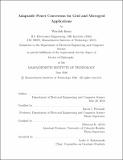Adaptable power conversion for grid and microgrid applications
Author(s)
Inam, Wardah
DownloadFull printable version (20.30Mb)
Other Contributors
Massachusetts Institute of Technology. Department of Electrical Engineering and Computer Science.
Advisor
David J. Perreault and Khurram K. Afridi.
Terms of use
Metadata
Show full item recordAbstract
Power electronics convert and control power and are an essential part of many electronic devices and systems. Increasingly, power converters need to operate over widely varying operating conditions (voltage, current and power level), which can degrade their performance. In many applications, power converters are also being interconnected to form power systems. This is challenging as the converters may have to operate in various configurations. In order to ensure best performance, power converters and systems need to adapt to the operating conditions by adjusting topology, component values or control characteristics. In this thesis, two applications are considered: universal input power supplies and off-grid electrification. More than 3 billion power supplies were sold worldwide in 2014 [1], with efficiencies ranging from 50-90% [2], which results in significant energy loss. A major portion of these are universal input power supplies (designed to operate at AC line voltages found globally). In this thesis, a control technique, Variable Frequency Multiplier (VFX), is developed which compresses the effective operating range required of a resonant converter by switching the inverter and/or rectifier operation between processing energy at a fundamental frequency and one or more harmonic frequencies. This technique was applied to the inverter stage of a stacked-bridge LLC converter for a universal input power supply. An efficiency of 94.9% to 96.6% was achieved for a 50 W converter operating across the entire (4:1) input voltage range. Even though centralized grid infrastructure is widespread, access to electricity is still limited in many parts of the developing world. More than 1.2 billion people globally do not have access to electricity [3]. In this thesis, an ad hoc modular microgrid architecture is developed and field-tested. Contrary to how conventional power systems are designed, these microgrids do not require pre-planning and can operate in any network configuration. Smart power management units have been designed to arbitrarily connect power sources and loads, forming an autonomous microgrid. Accurate power sharing of multiple power sources is demonstrated. A methodology to attain the lowest system cost by designing power converters that reduce lifetime energy loss has also been developed. This enables affordable and reliable electricity to be provided in off-grid areas. Improvements in these applications will have a significant impact on power utilization from the existing grid infrastructure, and will help define the future of power utilization where this infrastructure does not exist. Moreover, the techniques and designs developed, in this thesis, for adaptable and efficient operation of power converters and systems can be easily extended to other applications.
Description
Thesis: Ph. D., Massachusetts Institute of Technology, Department of Electrical Engineering and Computer Science, 2016. This electronic version was submitted by the student author. The certified thesis is available in the Institute Archives and Special Collections. Cataloged from student-submitted PDF version of thesis. Includes bibliographical references (pages 215-223).
Date issued
2016Department
Massachusetts Institute of Technology. Department of Electrical Engineering and Computer SciencePublisher
Massachusetts Institute of Technology
Keywords
Electrical Engineering and Computer Science.